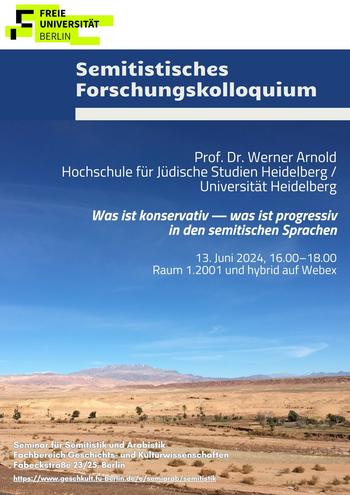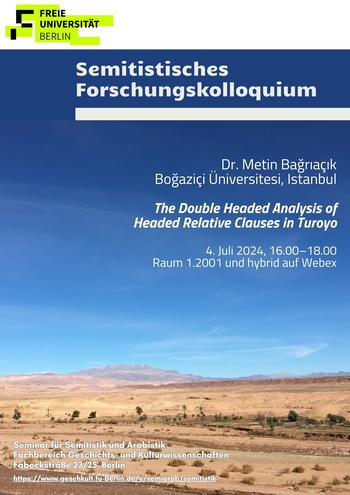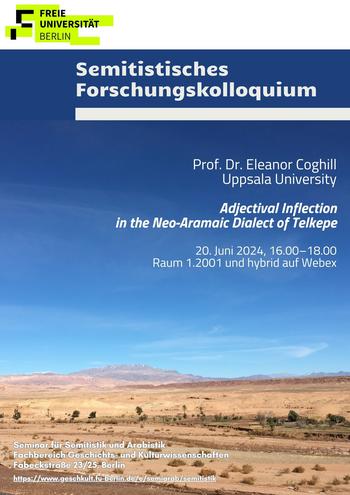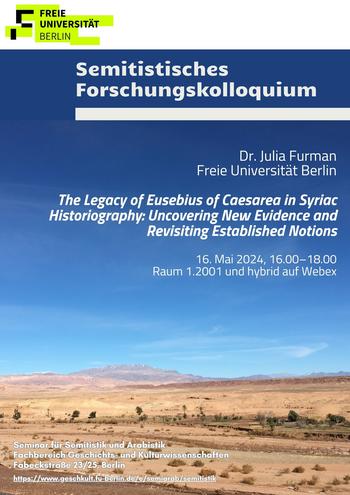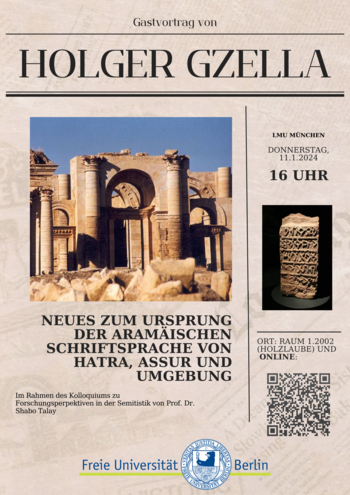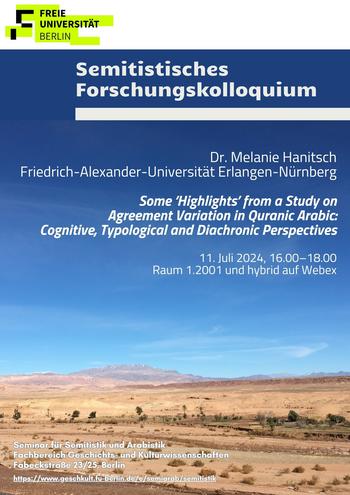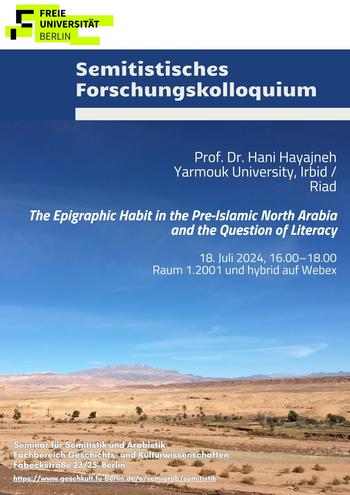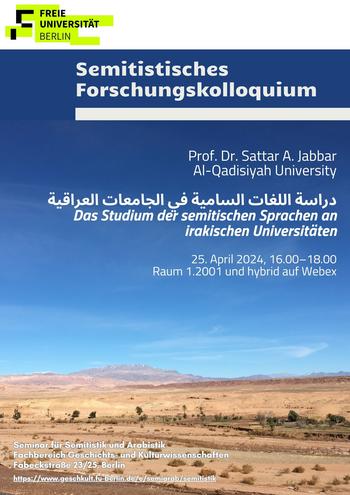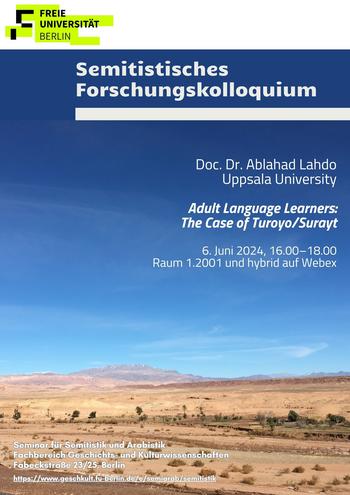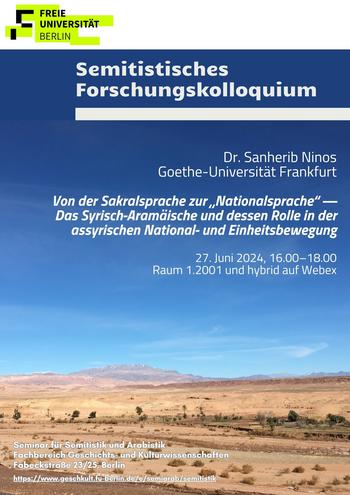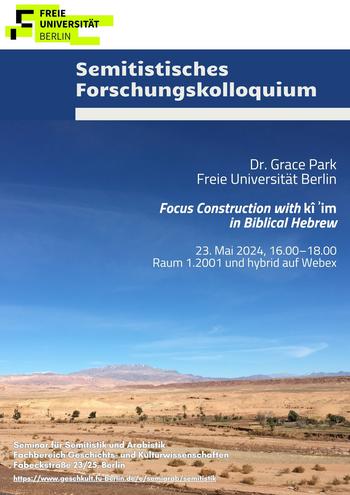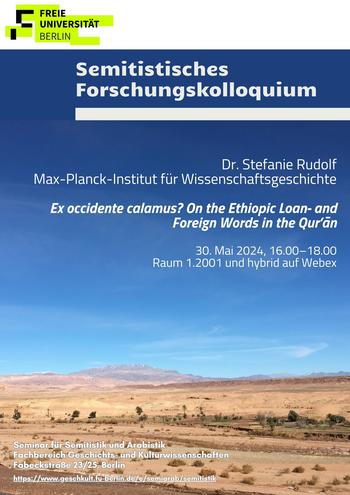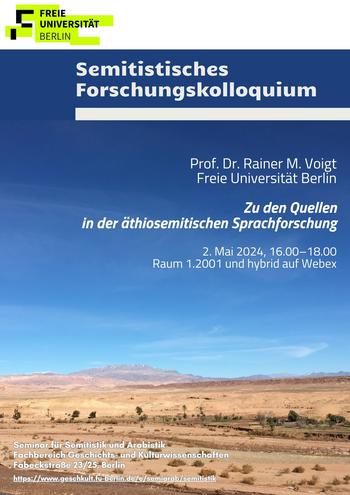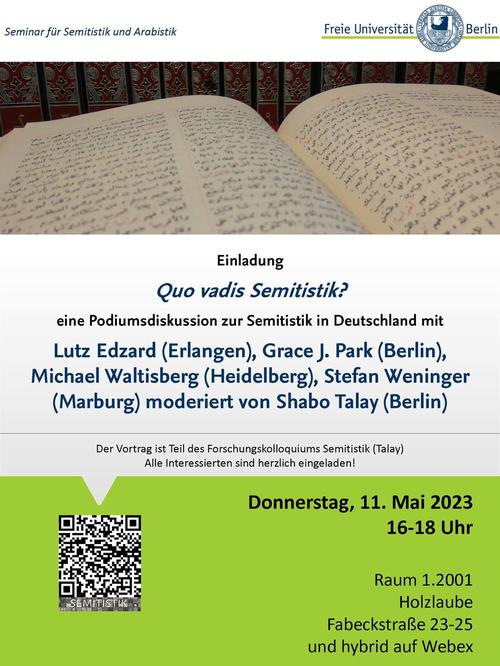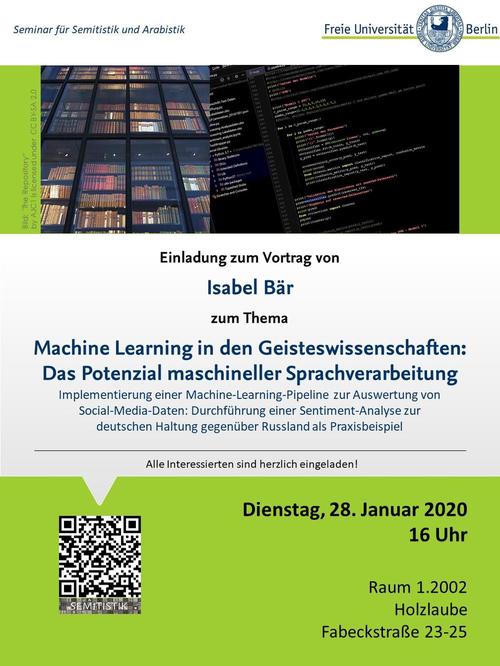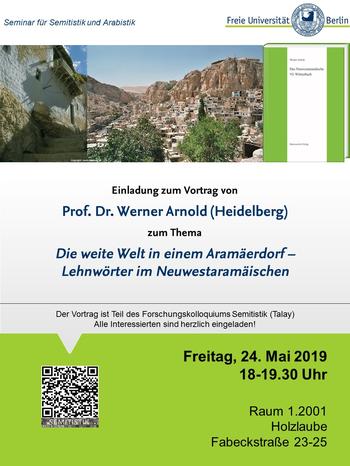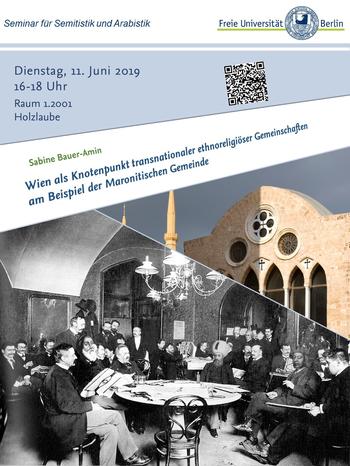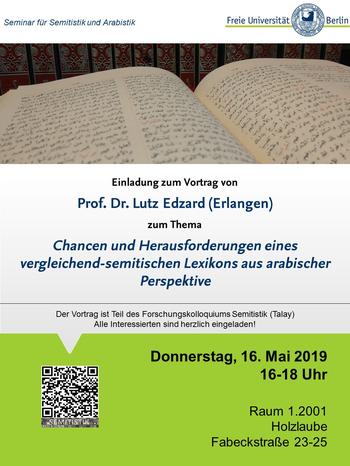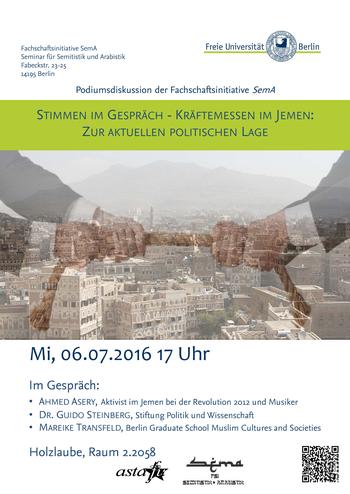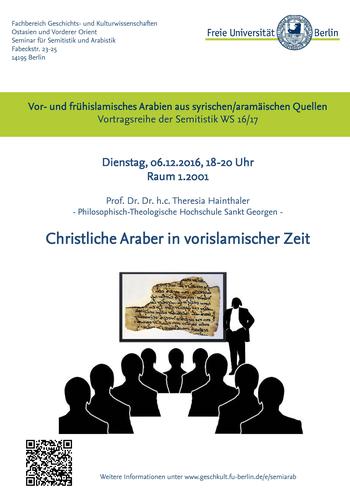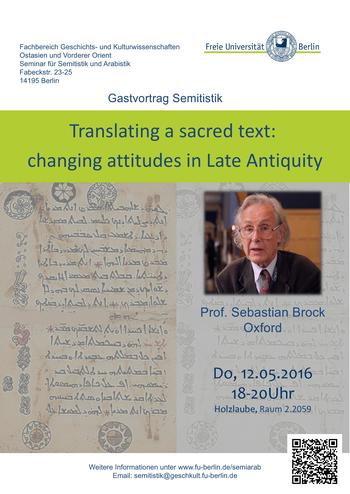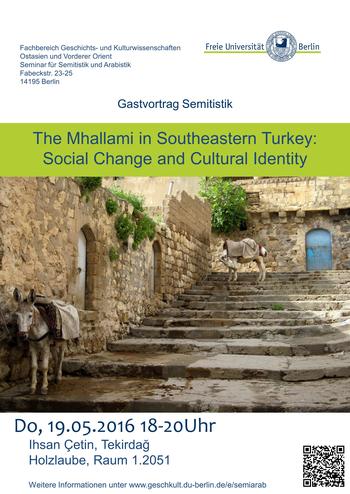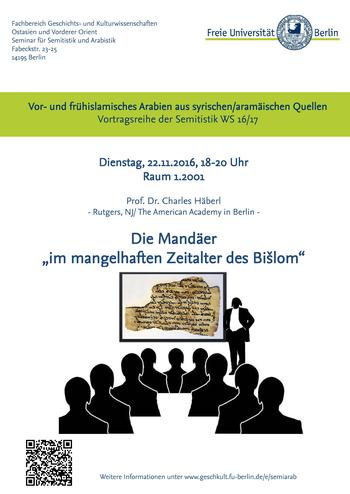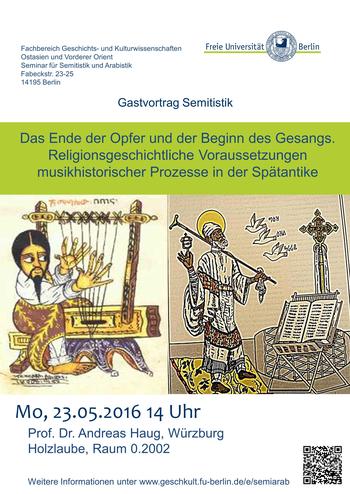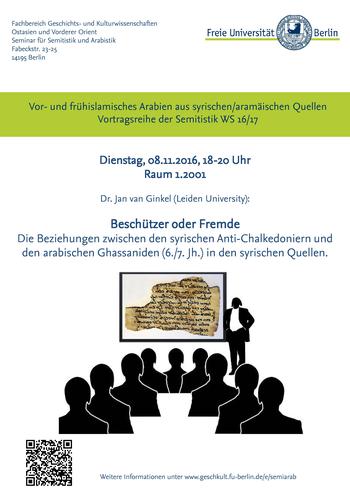Lectures
Lectures 2024
13.06.2024
Was ist konservativ — was ist progressiv in den semitischen SprachenProf. Dr. Werner Arnold (Heidelberg)
The lecture is part of the Semitic Research Colloquium 2024.
https://fu-berlin.webex.com/fu-berlin/j.php?MTID=m244269c0e63495b3f4bc62b8b4e62fb4
Meeting-Kennnummer:2794 623 1003
Meeting-Passwort:a2jFPxWK5p8
04.07.2024
The Double Headed Analysis of Headed Relative Clauses in TuroyoDr. Metin Bağrıaçık (Istanbul)
The lecture is part of the Semitic Research Colloquium 2024.
https://fu-berlin.webex.com/fu-berlin/j.php?MTID=m244269c0e63495b3f4bc62b8b4e62fb4
Meeting-Kennnummer:2794 623 1003
Meeting-Passwort:a2jFPxWK5p8
20.06.2024
Adjectival Inflection in the Neo-Aramaic Dialect of TelkepeProf. Dr. Eleanor Coghill (Uppsala)
The lecture is part of the Semitic Research Colloquium 2024.
https://fu-berlin.webex.com/fu-berlin/j.php?MTID=m244269c0e63495b3f4bc62b8b4e62fb4
Meeting-Kennnummer:2794 623 1003
Meeting-Passwort:a2jFPxWK5p8
16.05.2024
The Legacy of Eusebius of Caesarea in Syriac Historiography: Uncovering New Evidence and Revisiting Established NotionsDr. Julia Furman (Berlin)
The lecture will take place at 16:15 in room 1.2001 (Holzlaube) and will be broadcast on Webex.
https://fu-berlin.webex.com/fu-berlin/j.php?MTID=m244269c0e63495b3f4bc62b8b4e62fb4
Meeting-Kennnummer:2794 623 1003
Meeting-Passwort:a2jFPxWK5p8
11.07.2024
Some ‘Highlights’ from a Study on Agreement Variation in Quranic Arabic: Cognitive, Typological and Diachronic PerspectivesDr. Melanie Hanitsch (Erlangen)
The lecture is part of the Semitic Research Colloquium 2024.
https://fu-berlin.webex.com/fu-berlin/j.php?MTID=m244269c0e63495b3f4bc62b8b4e62fb4
Meeting-Kennnummer:2794 623 1003
Meeting-Passwort:a2jFPxWK5p8
18.07.2024
The Epigraphic Habit in the Pre-Islamic North Arabia and the Question of Literacy)Prof. Dr. Hani Hayajneh (Irbid, Riad)
The lecture is part of the Semitic Research Colloquium 2024.
https://fu-berlin.webex.com/fu-berlin/j.php?MTID=m244269c0e63495b3f4bc62b8b4e62fb4
Meeting-Kennnummer:2794 623 1003
Meeting-Passwort:a2jFPxWK5p8
25.04.2024
دراسة اللغات السامية في الجامعات العراقيةProf. Dr. Sattar A. Jabbar (Al-Qadisiyah University)
The lecture will be held in the Arabic language both physicall in room 1.2001 as well as online on WebEx.
https://fu-berlin.webex.com/fu-berlin/j.php?MTID=m244269c0e63495b3f4bc62b8b4e62fb4
Meeting-Kennnummer:2794 623 1003
Meeting-Passwort:a2jFPxWK5p8
06.06.2024
Adult Language Learners: The Case of Turoyo/SuraytDoc. Dr. Ablahad Lahdo (Uppsala)
The lecture is part of the Semitic Research Colloquium 2024.
https://fu-berlin.webex.com/fu-berlin/j.php?MTID=m244269c0e63495b3f4bc62b8b4e62fb4
Meeting-Kennnummer:2794 623 1003
Meeting-Passwort:a2jFPxWK5p8
27.06.2024
Von der Sakralsprache zur „Nationalsprache“ — Das Syrisch-Aramäische und dessen Rolle in der assyrischen National- und EinheitsbewegungDr. Sanherib Ninos (Frankfurt)
The lecture is part of the Semitic Research Colloquium 2024.
https://fu-berlin.webex.com/fu-berlin/j.php?MTID=m244269c0e63495b3f4bc62b8b4e62fb4
Meeting-Kennnummer:2794 623 1003
Meeting-Passwort:a2jFPxWK5p8
In room 1.2001 (Holzlaube) as well as online.
https://fu-berlin.webex.com/fu-berlin/j.php?MTID=m244269c0e63495b3f4bc62b8b4e62fb4
Meeting-Kennnummer:2794 623 1003
Meeting-Passwort:a2jFPxWK5p8
23.05.2024
Focus Construction with kî ʾim in Biblical HebrewDr. Grace Park (Berlin)
The lecture will take place at 16:15 in room 1.2001 (Holzlaube) and will be broadcast on Webex.
https://fu-berlin.webex.com/fu-berlin/j.php?MTID=m244269c0e63495b3f4bc62b8b4e62fb4
Meeting-Kennnummer:2794 623 1003
Meeting-Passwort:a2jFPxWK5p8
30.05.2024
Ex occidente calamus? On the Ethiopic Loan- and Foreign Words in the Qur’ānDr. Stefanie Rudolf (Tübingen)
The lecture is part of the Semitic Research Colloquium 2024.
https://fu-berlin.webex.com/fu-berlin/j.php?MTID=m244269c0e63495b3f4bc62b8b4e62fb4
Meeting-Kennnummer:2794 623 1003
Meeting-Passwort:a2jFPxWK5p8
02.05.2024
Zu den Quellen in der äthiosemitischen SprachforschungProf. Dr. Rainer M. Voigt (Berlin)
The lecture will take place at 16:15 in room 1.2001 (Holzlaube) and will be broadcast on WebEx.
https://fu-berlin.webex.com/fu-berlin/j.php?MTID=m244269c0e63495b3f4bc62b8b4e62fb4
Meeting-Kennnummer:2794 623 1003
Meeting-Passwort:a2jFPxWK5p8
Lectures 2023
29.06.2023
Vortrag im Rahmen des Semitistischen Forschungskolloquiums mit dem Titel "Moroccan Judeo-Arabic: diachrony and contact"
JONAS SIBONY (Paris): Moroccan Arabic verbs in Peripheral Israeli Hebrew.
FELIPE FRANCISCO (Berlin): Vernacular archaisms of Moroccan Arabic in a letter by Yahuda Ben Zamirro (16th century).
30.06.2023
“Aktuelle Entwicklungen im Bereich des Hinweisgeber:innen-Schutzes in der Wissenschaft” mit Dr. Hjördis Czesnick (Leiterin der Geschäftsstelle des Gremiums "Ombudsman für die Wissenschaft")Das OBUA-Projekt lädt herzlich zum Vortrag “Aktuelle Entwicklungen im Bereich des Hinweisgeber:innen-Schutzes in der Wissenschaft” ein!
Dr. Hjördis Czesnick, Leiterin der Geschäftsstelle des Gremiums "Ombudsman für die Wissenschaft" wird in ihrem Vortrag auf aktuelle Entwicklungen im Bereich des Hinweisgeber:innen-Schutzes eingehen. In wissenschaftlichen Einrichtungen sind schon lange Ombudspersonen eingesetzt, an die sich Hinweisgebende mit Beobachtungen möglicher GWP-Verstöße wenden können. Zeitnah wird nun ein neues Hinweisgeberschutzgesetz in Deutschland implementiert, um die EU-Richtlinie "Protection for whistleblowers" zu implementieren. Es wird besprochen, welche Auswirkungen dies auf das Whistleblowing in der Wissenschaft haben wird. Der Vortrag geht auf die Verantwortung und mögliche Maßnahmen wissenschaftlicher Einrichtungen im Bereich des Schutzes von Hinweisgeber:innen ein und zeigt aktuelle internationale Entwicklungen im Bereich der guten wissenschaftlichen Praxis, etwa im European Network of Research Integrity Offices (ENRIO), auf.
01.03.2023
“The potential impact of AI generated texts on good scientific practice and Ombuds work” with Dr. Glatzmeier (FU Berlin)The OBUA project cordially invites you to our first Lunch Talk on “The potential impact of AI generated texts on good scientific practice and Ombuds work” with Dr. Armin Glatzmeier (FU Berlin)!
In a brief lunch talk, Dr. Glatzmeier will introduce the functions of ChatGPT and report on the current state of the debate around its applicability and potential misuse in academic contexts. Afterwards, you will have the opportunity to discuss your own questions, and maybe already experiences, with us.
The event will take place in English via Webex on Wednesday, March 1, 12-1pm (s.t.).
Short abstract
The recent debate around research integrity and AI generated texts since the release of ChatGPT has potential repercussions on issues of good scientific practice in general and Ombuds work in particular, especially in the area of authorship and questionable research practices.
Dr. Armin Glatzmeier is part of the Teaching Library team at Freie Universität Berlin and is involved in the implementation and further development of courses to promote writing skills and fostering good scientific practice.
30.03.2023
“Are questionable research practices a ‘basic condition’ when doing research? ” with Prof. Jesper W. Schneider (Aarhus University)The OBUA project cordially invites you to a talk on “Are questionable research practices a ‘basic condition’ when doing research?” with Prof. Jesper W. Schneider (Aarhus University)!
Short abstract
The talk will discuss perceptions of questionable research practices and problematize the way in which we have tried to measure their prevalence. It scrutinizes popular perceptions and questions the usefulness of striving to have a category of practices labeled as questionable, providing examples from a recent large-scale study where some of the issues are addressed.
Prof. Schneider works as a meta-researcher at the Danish Center for Studies in Research and Research Policy, focusing, amongst other things, on questionable research practices and the perception of research quality. He is currently a visiting fellow at the Objective 3: Advancing Research Quality and Value of the Berlin University Alliance.
11.05.2023
Quo vadis Semitistik? Eine Podiumsdiskussion zur Semitistik in Deutschland mit Lutz Edzard (Erlangen), Grace J. Park (Berlin), Michael Waltisberg (Heidelberg), Stefan Weninger (Marburg) moderiert von Shabo Talay (Berlin)Diese Veranstaltung ist Teil des von Prof. Shabo Talay organisierten Semitistischen Forschungskolloquiums 2023.
Lectures 2022
Lectures 2021
Lexikographie und Wörterbucharbeit in der Semitistik
02.06.2021:
- Werner Arnold (Hochschule für Jüdische Studien Heidelberg): "Alphabetisch oder nach Wurzeln? Überlegungen zum Ordnen des Neuwestaramäischen"
- Zafer Youssef (FU Berlin): "Korpusbasiertes Wörterbuch der syrisch-arabischen Dialekte - Bericht über den Stand"
- Stephan Procházka (University of Vienna) & Karlheinz Mörth (ACDH-CH): "The VICAV Damascus dictionary: Compiling a multi-purpose digital dictionary"
Grammatical traditions in contact: Studies on the Arabic, Greek and Syriac traditions
19.05.2021:
- Margherita Farina (CNRS): "Syriac metalinguistic terminology between 6th and 9th cent.: Some open issues"
- Simona Olivieri (FU Berlin): "Assessing influences in the early Arabic linguistic tradition"
- Nadia Vidro (University College London): "A book on Arabic inflexion according to the system of the Greeks: A lost work by Ḥunayn b. Isḥāq"
Arabic and Aramaic in Anatolia
28.04.2021:
- Otto Jastrow (Tallinn University): "Periphery of the Periphery - Remarks on qǝltu-Arabic dialects of Anatolia"
- Gabriel Biţună (University of Bucharest): "Siirti Arabic – A prolific Anatolian dialect"
- Paul M. Noorlander (University of Cambridge): "Neo-Aramaic and Neo-Arabic dialects entangled in Southeastern Anatolia and Northwestern Mesopotamia"
Insubordination in Semitic Languages
05.05.2021:
- Michael Waltisberg (Heidelberg University): "Assessing insubordination for Semitic linguistics"
- Grace Park (FU Berlin): "Stand-alone nominalization in Biblical Hebrew and Biblical Aramaic"
- Fabio Gasparini (FU Berlin): "Stand-alone nominalization in Modern South Arabian"
Jacob of Serugh and his reception in non-Syriac traditions
09.06.2021:
- Tamara Pataridze (University of Louvain): "Crossing boundaries: The reception of Jacob of Serugh in Georgian milieus"
- Andy Hilkens (Goethe University Frankfurt): "Jacob of Serugh in the Armenian tradition"
- Ted Erho (LMU Munich): "Jacob of Serugh's homilies in medieval and modern Ethiopia"
- Vasiliki Chamourgiotaki (FU Berlin): "The Arabic reception of Jacob of Serugh. A focus on the Sinaitic manuscripts"
Die Sprachpolitik der aramäischen/assyrischen Organisationen in Deutschland bezüglich des Neuaramäischen
07.07.2021:
- Aziz Said (Berlin): "Die Position des Zentralverbands der Assyrischen Vereinigungen in Deutschland (ZAVD)"
- Fadi Korkes (Würzburg): "Die Position der Föderation Suryoye Deutschland (HSA)"
Syriac and Aramaic Studies in the Digital Age
16.06.2021:
- Anna-Simona Barbara Üzel (FU Berlin): "The first treatise of Bar Ṣalībī against the Nestorians"
- Nikita Kuzin (FU Berlin): "Corpus and lexicography tools for the Ṭuroyo studies"
- Nicolas Atas (FU Berlin): "The PoS-tagged Syriac Corpus of the GREgORI Project"
Romance languages and Maghrebi Arabic dialects in contact
12.05.2021:
- Ángeles Vicente (University of Zaragoza): "The interaction between Spanish and Moroccan Arabic: A relationship of several centuries"
- Veronika Ritt-Benmimoun (University of Vienna): "it-tǟlīfūn ysōni w-il-firšēṭa fi-l-kūžīna: Romance influence on the Tunisian lexicon"
- Felipe Francisco (FU Berlin): "A quest for Portuguese loanwords in Moroccan Arabic"
Lectures 2020
Kevin White: Opportunity Knocks: Recent Discoveries and Challenges in Nestorian Christianity
2015 fand ein Landwirt im östlichen Kasachstan einen großen Stein mit der Abbildung eines Kreuzes und syrischer Schrift. Diese Entdeckung und die darauffolgenden Ausgrabungen enthüllten die verlorene Seidenstraßenstadt Ilibalik, die der Chronist von Hethum I, dem König von Armenien, als eine Stadt der Christen beschrieb. Nachfolgende Ausgrabungen haben über hundert Gräber zu Tage gefördert und zeigen Indizien einer entwickelten Stadt. Es wird geschätzt, dass Ilibalik größer als das mittelalterliche Jerusalem war, doch bleibt es noch zu weniger als 1% ausgegraben. Wir werden uns die außerordentlichen Funde und Entwicklungen in Kasachstan und ihre weiterenImplikationen ansehen.
Lectures 2019
Lectures 2016
Die Fachschaftsinitiative der Semitistik und Arabistik (SemA) der Freien Universität Berlin veranstaltete die Diskussionsreihe „Stimmen im Gespräch – Kräftemessen im Jemen – Ein Blick auf die aktuelle Lage“ Gesprächspartner waren Mareike Transfeld (Stiftung Wissenschaft und Politik), Dr. Guido Steinberg (Stiftung Wissenschaft und Politik) und Ahmed Asery (Musiker und Aktivist).
